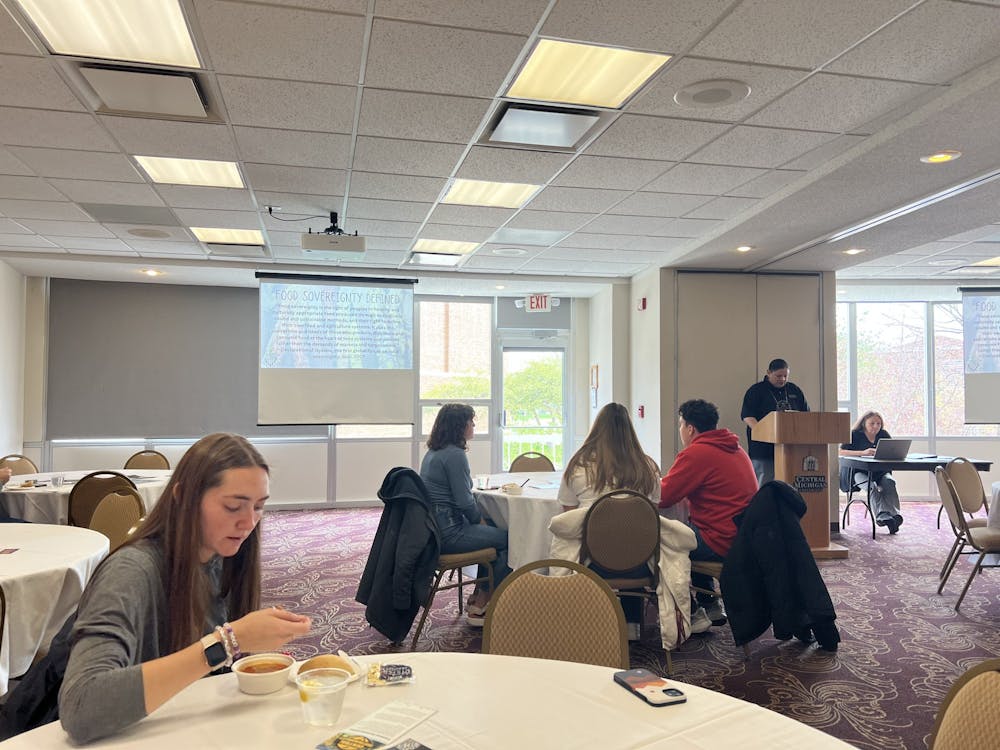Soup and substance: “Food sovereignty is one of the most basic forms of decolonization”

Extension Coordinator at the Saginaw Chippewa Tribal College Guadalupe ‘Lupe’ Gonzalez speaks about food sovereignty during Central Sustainability's Soup and Substance event Thursday, April 20.
On Thursday, April 20, Central Sustainability hosted a Soup and Substance event as part of it’s Earth Week events calendar. Partnered with the Office of Institutional Diversity, Equity and Inclusion, administrators for the Saginaw Chippewa Tribal College (SCTC) came to discuss food sovereignty over traditional Anishinaabek soup and refreshments.
For just over an hour, Central Michigan University students, faculty and community members joined together in the Bovee University Center Terrace Room to learn and discuss the importance of food sovereignty to all, but especially in regards to Indigenous communities.
“Food sovereignty is one or the most basic forms of decolonization,” SCTC Extension Coordinator Guadalupe ‘Lupe’ Gonzalez said in a video shared during their presentation. “We are learning, or rather unlearning, and sharing this with our community.”
According to Bureau of Indian Affairs, there's no universal definition for food sovereignty. However, the description used during the presentation was from the Declaration of Nyeleni during the 2007 World Forum for Food Sovereignty.
”[Food] sovereignty is the right of peoples to healthy and culturally appropriate food produced through ecologically sound and sustainable methods, and their right to define their own food and agriculture systems,” the declaration said.
For the majority of the event, the focus of the presentation was solely on SCTC’s food sovereignty garden named Mshkikiikaan, or Place of the Medicine. Gonzalez said they didn’t name the garden this because they were growing medicine there -- although they grow some sweetgrass and sage among other traditional medicines -- but because it was healing to just be there.
”It was medicine for our soul,” he said.
“COVID was the point where we really learned how fragile our food systems were,” Gonzalez said. “When you go to the store and everything is gone, it's like, 'what are we gonna eat?'
“That's when we really started wanting to get more into food sovereignty.”
Through long days and nights of hard work, dedication and plenty of trial and error, Gonzalez and other students and faculty at SCTC, and tribal community members have managed to grow their food sovereignty garden. And they don’t plan on slowing down.
While they have faced many challenges along the way: their Three Sisters garden has been their biggest success, Gonzalez said. According to Gonzalez, a Three Sisters garden is “an indigenous form of companion planting that has been done for thousands of years.”
According to cmich.edu, “The Three Sisters garden includes beans, corn and squash — three plants that work together and support one another. Sister Bean fixes nitrogen from the air, Sister Corn offers support for the bean's trailing vine, and Sister Squash provides ground cover that holds moisture and maintains a healthy soil environment while deterring animal invaders with its spiny stems."
This was also the soup served at the event Thursday afternoon.
“I don't think people think about where their food comes from, [enough]. We should think about it, and not only that, we should try to do something about it,” Gonzalez said. “If we're able to garden, which I understand not everybody is able to, but if you are able to, you should learn how.
“I didn't know what I was doing [when we first started], we just jumped in and ... look what we did. It's really not that hard. Don't be afraid.”
The second portion of the event was focused mainly on a discussion among the spectators. Prompted with questions about food sovereignty and sustainability, audience members to reflect on their own experience, or lack thereof, with these issues.
“I feel like [non-Indigenous people] have a lot to learn from these communities, and they're just not given the space for it,” CMU sophomore and Sustainability Coordinator for Central Sustainability Tiffany Jurge said. “CMU possesses such a unique connection to the Tribal college and I feel like that can be shown much more than just land and acknowledgment.”
According to cmich.edu, in 2021, Central Sustainability partnered with students and staff from SCTC to build an ethnobotanical garden on CMU’s campus where they now grow the Three Sisters, sage and other plants significant to the Saginaw Chippewa Indian Tribe. This garden, along with this Soup and Substance event are all in efforts to create a “cultural bridge” between these two communities.
“Something I was always interested in is how to get closer with the Saginaw Chippewa Tribal College,” Jurge said. “In my environmental studies major, we talked a lot about issues like sustainability, and we touched on how it appears in Indigenous communities.”
While these efforts are important in the short term, Jurge and Central Sustainability plan to continue to do more in the future.
“Next on my agenda is, what can we do for the Tribal college?” Jurge said. “I know that next year we'll be going over there and planning some sort of event with the students and just offering our support, volunteers, anything they need.
“Any opportunity that we can branch to strengthen this bond is amazing.”






